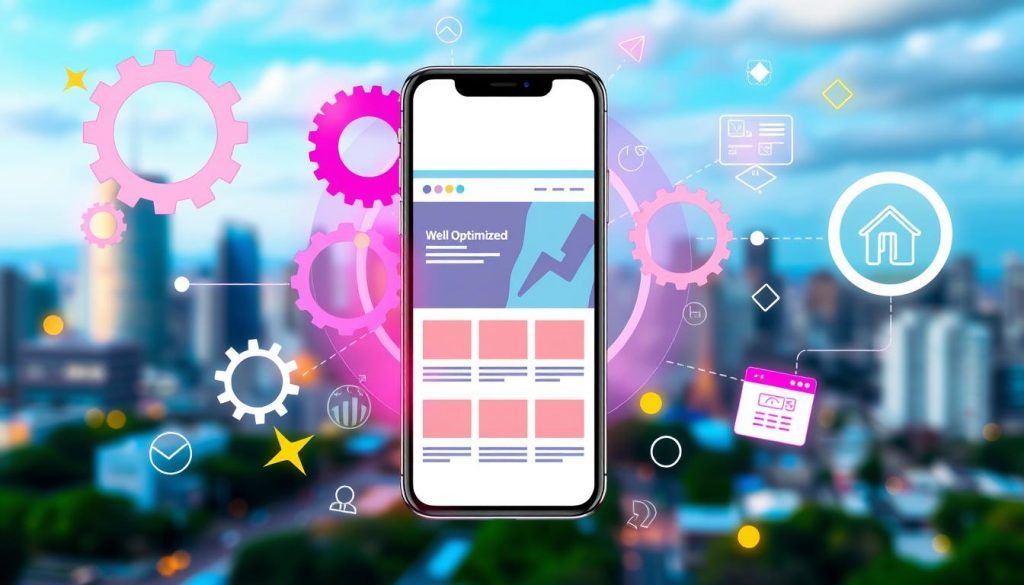In today’s digital world, being seen online is key. A smart SEO strategy can unlock your website’s full power. Brian Dean’s site got 362,732 organic visitors monthly with the right SEO1. We aim to share tips to get your site to the top, bringing in more visitors and turning them into loyal customers.
Good SEO means using many tactics. This includes finding the right keywords, making your site easy to use, and building links. By picking about 10 keywords1 and using long-tail keywords that are less crowded but more specific1, we can make a solid plan to reach your audience.
Looking at what your competitors do is also key. By finding 4-5 main competitors and checking their content and links1, we can find ways to beat them and get more visibility online.
Creating unique content that’s better than what’s already out there is a great way to stand out1. Also, making your content match what people are searching for can increase your traffic by 70.43%1.
Key Takeaways
- A well-executed SEO strategy can drive significant organic traffic, as demonstrated by Brian Dean’s website’s 362,732 monthly visitors.
- Comprehensive keyword research, including identifying long-tail keywords, is critical for effective SEO.
- Competitor analysis helps find ways to outrank your main organic competitors.
- Creating unique, high-quality content that aligns with search intent can boost search engine traffic by over 70%.
- Using on-page SEO techniques, like internal linking and optimizing URLs, can improve your site’s visibility in searches.
Understanding the Importance of SEO Strategy
Search Engine Optimization (SEO) is key for businesses wanting to grow online. It helps attract more people to their website. By using good SEO, companies can rank higher in search engines, be seen more, and get more customers2.
What is SEO and Why it Matters
SEO makes a website better for search engines like Google. It improves a site’s visibility and brings in quality traffic. This can lead to more sales and growth for businesses2.
Key Components of a Successful SEO Strategy
A good SEO plan has several important parts:
- Doing deep keyword research to find the right search terms2
- Creating content that is useful and interesting to users2
- Improving on-page elements like meta tags and URLs2
- Getting links from trusted sites to boost your site’s authority2
- Working on technical SEO like making your site fast and mobile-friendly2
By focusing on these areas, businesses can rank better, be seen more, and get more visitors234.
“A well-executed SEO strategy can be a game-changer for businesses, helping them reach new audiences, increase brand awareness, and ultimately drive more conversions.”
SEO is vital in today’s digital world. It helps businesses grow and succeed online. By knowing SEO basics and using a full strategy, companies can find new ways to succeed234.
Setting Clear SEO Goals
It’s key to set clear SEO goals to track your progress. These goals should be SMART (Specific, Measurable, Achievable, Relevant, and Time-Bound). This helps you plan your path to success and fine-tune your strategies.
Defining Measurable Objectives
Your SEO objectives must be easy to measure. For example, you might aim to increase total unique web traffic year-over-year by 50%5. Or, you could aim to achieve first-page ranking for specific keyword set within 12 months5. You might also want to increase average session duration on blog pages by 33% by the end of the year5. These SMART goals help you know when you’ve succeeded and guide your decisions.
Aligning SEO Goals with Business Goals
It’s vital to link your SEO goals with your business goals. This ensures your digital marketing helps the company’s bottom line. You might aim to generate 1,500 leads in the next 12 months5. Or, you could aim to increase online sales from organic traffic by $3M year-over-year5. By tracking key performance indicators (KPIs) and business alignment, you can make your SEO strategy better and show its value to your organization.
Good SEO strategy is about real business results, not just rankings. By setting clear, measurable, and aligned SEO objectives, your digital marketing will help your company grow and make more money.
Conducting Comprehensive Keyword Research
Effective keyword research is key to a successful SEO strategy. It helps us find the right keywords and phrases our audience is searching for online6. For example, the keyword “small business SEO” has a high search volume and difficulty level7.
Google’s search algorithm uses over 200 factors to rank websites. Understanding what people are searching for is essential for creating good content.
Tools for Keyword Research
Many SEO tools help with keyword research7. Tools like Google Analytics and Keyword Planner are great for this. They let us see search volume and competition levels.
Tools like Ahrefs and Semrush also help find related keywords. This information helps shape our content strategy6. Google Analytics and HubSpot’s Traffic Analytics tool are good for finding keyword ideas and tracking website traffic.
Analyzing Competitor Keywords
Looking at what competitors are targeting is important7. To rank well, sites need valuable content and backlinks. By studying competitors’ keywords, we can create unique content that attracts new audiences6.
For example, “cat detective agency” has lower search volume than “paranormal investigator.” So, focusing on high-volume, relevant keywords might be better.
Long-Tail vs. Short-Tail Keywords
7 Long-tail keywords have 3 or more words and are used by shoppers closer to making a purchase. They might have lower search volumes but are less competitive and easier to rank for6. Good keyword research helps us understand current trends and focus on relevant topics7.
But, remember, high search volume isn’t always the best. Targeting less competitive keywords can attract more qualified traffic.
6 HubSpot used search volume data to categorize topics. For example, “marketing automation” has a high search volume. Keywords like “AI marketing tools” and “lead nurturing” were brainstormed under this topic7. Keyword research is key, but creating valuable content is what sets you apart.
“Effective keyword research is the cornerstone of any successful SEO strategy.”
On-Page SEO Best Practices
On-page8 optimization is key to a good SEO strategy. It helps our website show up better in search results9. SEO makes it easier for search engines to understand our content and for users to find what they need9.
Importance of Meta Tags
Meta tags, like title and description, are vital for search results8. They help our pages get more clicks from search results. In fact8, 59% of pages with better meta descriptions get more clicks. Google also suggests keeping title tags short, under 60 characters, for mobile devices.
Creating Quality Content
Making unique, valuable, and relevant content is key for 202410. On-page SEO has become more complex10. Tools like Semrush’s On-Page SEO Checker make optimizing content easier10.
Optimizing URL Structures
URL structure affects search rankings and user understanding8. Shorter URLs perform better in search results8. Including keywords in URLs helps users understand the content better9.
By following these on-page8 SEO tips, we can make our websites more visible and perform better. This leads to more qualified traffic and a stronger online presence.

Off-Page SEO Techniques
Off-page SEO is just as important as on-page SEO for better search rankings. It involves getting quality backlinks, using social media, and joining online communities. These actions boost your website’s authority and make it more visible11.
Building Quality Backlinks
Getting good backlinks is a key off-page SEO tactic. Tools like Semrush’s Authority Score help measure backlink quality and quantity. This score is a strong indicator of a webpage’s ranking11.
Creating unique content like original research or detailed guides can attract natural backlinks. For example, Brian Dean’s voice search study got 5.6K backlinks11. You can also find broken links and get brand mentions to get quality backlinks11.
Leveraging Social Media
Social media sites like LinkedIn, Facebook, Twitter, and Instagram are great for off-page SEO. They have high domain authority, making social media marketing very effective12. Sharing your content on these platforms can increase traffic and backlinks, helping your SEO11.
Influencer marketing and digital PR can also boost your brand’s visibility and backlink chances11.
Engaging in Online Communities
Joining online forums and discussion boards is a valuable off-page SEO strategy. By sharing valuable insights, you can become seen as an industry expert. This can lead to backlink opportunities and more brand mentions11.
Guest posting on relevant blogs is another way to reach new audiences and get quality backlinks12.
With a solid off-page SEO plan, businesses can see big improvements in search visibility. They can also boost their domain authority and attract more qualified traffic to their site1112.
Technical SEO Essentials
SEO is more than just making great content. It also needs a strong technical base. This ensures your site works well for search engines. We’ll look at key technical SEO elements to boost your site’s visibility and rankings.
Ensuring Mobile-Friendliness
Google now focuses on mobile versions of websites13. Your site must work well on all devices. This means having a design that adjusts to screen size, fast loading, and easy navigation14.
Improving Site Speed
Page speed is key for both mobile and desktop users13. Faster sites rank higher because they offer a better user experience. You can speed up your site by compressing images, minifying code, and using a CDN1315.
Implementing XML Sitemaps
An XML sitemap lists all your site’s pages, helping search engines crawl and index your content better14. It’s vital for big sites, new sites, or sites with lots of media or links14.
By focusing on these technical SEO areas, your site will be better for search engines. This means higher rankings in search results131415.

| Technical SEO Factor | Importance | Impact |
|---|---|---|
| Mobile-Friendliness | High | Google’s mobile-first indexing requires a seamless mobile experience. |
| Site Speed | High | Faster loading pages lead to better user experience and higher rankings. |
| XML Sitemaps | Medium | Sitemaps help search engines discover and index website content more efficiently. |
“Technical SEO is the foundation upon which all other SEO efforts are built. Without a solid technical structure, your website will struggle to rank, no matter how great your content is.”
Content Strategy for SEO
A strong content strategy is key for SEO success. Content is at the core of any good SEO plan. It helps attract and engage your target audience. By knowing which content types rank well and the benefits of blogging and repurposing, businesses can boost their online presence and achieve real results.
Types of Content that Rank Well
Some content types stand out in search engine rankings. Guides, original research, and data-driven content are often favored. For instance, Brian Dean’s “The Definitive Guide to Link Building”16 is a top resource for SEO, attracting many quality backlinks.
The Role of Blogging in SEO
Blogging is a valuable SEO tool. Regularly posting fresh, keyword-rich content shows search engines your site is active and relevant. Blogs also offer chances for internal linking, improving site structure and user experience16.
Repurposing Existing Content
Repurposing content can be a smart move. It helps reach new audiences and adds SEO value. Turning a blog post into an infographic or video can attract links and engage different users17.
With a strategic content approach, businesses can fully leverage SEO. They can become industry leaders by creating top content, blogging effectively, or repurposing content. A well-thought-out content strategy is the base for lasting SEO success.
Local SEO: Targeting Local Audiences
In today’s digital world, local search optimization is key for small and medium-sized businesses. Targeting local audiences helps them compete with bigger brands. It builds trust and preference in their community18. This strategy also boosts conversion rates, making it vital for reaching local customers18.
Importance of Google My Business
Google My Business is a vital part of local SEO. It’s free and lets businesses manage their online info, like name, address, and phone number18. Claiming and optimizing your Google My Business listing is key for local search and Google Maps visibility19.
70% of local searchers visit a store within five miles of their search location19.
Optimizing for Local Searches
To reach local audiences, you need to find the right keywords. Use tools to find local keywords with high search volume and low competition18. Add location-specific terms to your strategy18. Analyzing competitors’ sites can also help.
After finding your keywords, optimize your website. Use these keywords in your content, meta tags, and descriptions18. Create landing pages for specific local search queries18. Keep your business info consistent across all platforms18.
By following these local SEO tips, businesses can better engage with their local audience. This leads to more foot traffic and sales18. Remember, 46% of Google searches are for local info19. So, optimizing for local search is essential for any digital marketing plan.
“We grew to 100k/mo visitors in 10 months with AIContentfy”
– Founders of AIContentfy
SEO Analytics and Performance Tracking
It’s key to track your SEO strategy’s performance. This helps make decisions based on data to boost your website’s visibility. By watching SEO metrics, you learn what works and what needs tweaking.
Key Metrics to Monitor
Important SEO metrics include organic traffic, keyword rankings, and click-through rates (CTR). Organic traffic shows how well your site ranks for keywords. Keyword rankings show your page’s visibility in search results, which can lead to more visitors20.
Click-through rates and bounce rates tell you if your titles, descriptions, and content grab and keep users’ attention20. Conversion rates, showing how many visitors complete actions like buying or filling out forms, are key to seeing your SEO’s impact on your business20.
Tools for Tracking SEO Performance
Google Analytics and Google Search Console are free tools for tracking your site’s performance21. Paid SEO tools like Moz, Ahrefs, and SEMRush offer more features, such as keyword tracking and backlink analysis21. These tools help you monitor your SEO performance and make smart, data-driven decisions to boost your online presence.
By regularly checking your SEO metrics and using the right analytics tools, you can better understand your site’s performance. This approach helps optimize your online presence, increase organic traffic, and reach your business goals20.
The references for the statistical data used in this text are from link 121. The references for the statistical data used in this text are from link 2.
Continuous Improvement of SEO Strategy
The digital world is always changing, and so must our SEO approach. Keeping up with SEO trends is key to staying ahead. We read industry blogs, go to conferences, and join webinars to learn the latest22.
Staying Current with SEO Trends
SEO changes fast, with Google updating its algorithms over 10 times in 202222. We update our content and keywords regularly to keep up23. We also make sure our websites work well on mobile devices, as most people use them online23.
Regularly Updating Content
We make sure our content is fresh and relevant. Brian Dean, a top SEO expert, updates his content regularly23. We check our website’s performance to see what content works best with our audience23.
Adapting to Algorithm Changes
Search engine algorithms, like Google’s Core Web Vitals, keep changing. We stay alert to these changes to keep our SEO strategy strong22. By being flexible and proactive, we can succeed in the ever-changing SEO world24.
FAQ
What is SEO and why is it important?
What are the key components of an effective SEO strategy?
How do we set clear SEO goals and align them with business objectives?
What are the best practices for conducting keyword research?
Why is on-page SEO so important?
What are the key off-page SEO techniques?
What are the essential technical SEO considerations?
How can a content strategy support SEO success?
Why is local SEO important, and how can businesses optimize for it?
What are the key metrics to track for SEO performance?
How can we continuously improve our SEO strategy?
Source Links
- How to Create an Effective SEO Strategy in 2024 – https://backlinko.com/seo-strategy
- The Importance of SEO for Your Business & Why It’s So Powerful – https://www.metricmarketing.com/blog/the-importance-of-seo-for-your-business-benefits-of-seo-why-seo-is-so-powerful/
- Council Post: SEO: What It Is And Why It’s Important – https://www.forbes.com/councils/forbesagencycouncil/2023/02/07/seo-what-it-is-and-why-its-important/
- What is SEO & Why is It Important? – https://www.conductor.com/academy/why-seo-is-important/
- How To Set SMART SEO Goals & Objectives With Examples | Victorious – https://victorious.com/blog/seo-goals/
- How to Do Keyword Research for SEO: A Beginner’s Guide – https://blog.hubspot.com/marketing/how-to-do-keyword-research-ht
- Master the Process of Keyword Research | Mailchimp – https://mailchimp.com/resources/how-to-do-keyword-research/
- On-Page SEO: What It Is and How to Do It – https://www.semrush.com/blog/on-page-seo/
- SEO Starter Guide: The Basics | Google Search Central | Documentation | Google for Developers – https://developers.google.com/search/docs/fundamentals/seo-starter-guide
- On-Page SEO: The Definitive Guide + FREE Template (2024) – https://backlinko.com/on-page-seo
- What Is Off-Page SEO? A Guide to Off-Page SEO Strategy – https://www.semrush.com/blog/off-page-seo/
- What Is off-Page SEO? 15 off-Page SEO Tips to Boost Rankings – https://optinmonster.com/off-page-seo/
- What Is Technical SEO? Basics and Best Practices – https://www.semrush.com/blog/technical-seo/
- Technical SEO For Beginners: The 4 Must-Have Components – https://www.klientboost.com/seo/technical-seo/
- The Ultimate Guide to Technical SEO – https://blog.hubspot.com/marketing/technical-seo-guide
- How to Create an SEO Strategy for 2024 [Template Included] – https://blog.hubspot.com/marketing/seo-strategy
- How to Create an SEO Content Strategy (Follow the Ahrefs’ Framework) – https://ahrefs.com/blog/seo-content-strategy/
- How to Use Local SEO to Reach Your Target Audience – https://aicontentfy.com/en/blog/how-to-use-local-seo-to-reach-target-audience
- 10 Powerful Local SEO Strategies for 2024 – New Target – https://www.newtarget.com/web-insights-blog/local-seo-strategies/
- SEO Results: How to Track & Measure SEO Performance – https://www.semrush.com/blog/seo-results/
- A Complete Guide To SEO Tracking (Updated 2024) | Dashthis – https://dashthis.com/blog/seo-tracking/
- Continuous SEO: Can You “Complete” SEO? – https://ahrefs.com/blog/continuous-seo/
- 5 Techniques for Continuous SEO Improvement – https://aicontentfy.com/en/blog/techniques-for-continuous-seo-improvement
- SEO strategy: 3 steps to strategic SEO – https://searchengineland.com/seo-strategy-strategic-seo-planning-437603









